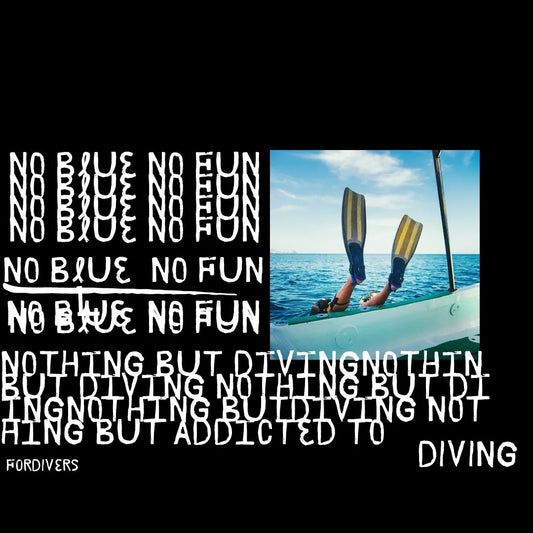The vast majority of dives are done from a boat, sometimes from fairly stable catamarans (the least) and others (the most) from dinghies. Yes, real nightmares for those prone to dizziness. Sooner or later, to a greater or lesser degree, divers have to deal with the unpleasant sensation of motion sickness on a cruise.
This type of dizziness is very common among divers. Directly or indirectly (maybe it was your buddy who felt that sickness) it is very common to suffer it, to such an extent that some have decided not to dive anymore from a liveaboard not to feel sick for a long week of diving.
In order to stop this dizziness ruining your diving experiences, this following tips will help you when embarking on your next dive. Starting with the identification of dizziness before it happens and what are the causes that start it to understand better ways to avoid them.
T-shirts designed by divers for divers
VIEW MORE T-SHIRTS FOR DIVERS
What causes dizziness?
If you have ever had that unpleasant feeling of vertigo, instability, cold sweats and nausea it is not necessary to explain you what it is to feel dizziness or motion sickness. You know how uncomfortable it is and how much it worries us when we are on a boat with the dive gear on, surrounded by a few divers and about to go down to 20 meters.
Why do I get dizzy when on a cruisse?
To understand what motion sickness is, you should understand how and through what organs we tell our brain that we are actually moving.
- The liquid of the semicircular canals of the inner ear allows us to perceive the movement and how it is: upwards, downwards, from one side to another, in circles or backwards. It is the organ responsible for maintaining the dynamic and static balance of our body
- What we see also tells the brain if we are moving and in what direction.
- The skin also participates in this process, indicating which parts of the body are in contact with the ground or other stable surfaces.
- Muscles and articulations also tell your brain what part of the body is moving, how fast we are moving or what position we are adopting at each moment.
All these receptors are providing information to your brain about your position or movement and "order" the rest of your body's actions according to that information. If one of these receptors gives any information different from the rest (some say movement and another says absence of movement) dizziness occurs. For example, has it ever happened to you reading in a moving car and getting dizzy?
This happens because your whole body tells the brain that you are moving except your eyes, that when they read the book they tell the brain that you are still. In a boat it works the same way. If while you are in the boat you look at the floor, the inner ear and the muscles will detect moving forward, up and down the waves, but the eyes are saying that there is no movement.
Your brain gets confused and this causes motion sickness affecting, among other things, your stomach. And why does it affect the stomach so much? Apparently, when we feel this confusion, our brain believes that it is produced by having ingested some toxic food and tries to expel it through vomiting.
Hoodies Designed for the Deck of Your Liveaboard
SEE MORE SWEATSHIRTS FOR DIVERS
How to avoid motion sickness?

Now that we know why motion sickness occurs, the next step to avoid it is obvious: make it clear at all times to your brain that we are actually moving. How?
- Travel always looking forward. Sit always oriented in the direction of the boat avoiding looking back for a long time. If you sit forward, your eyes and ears will capture the movement simultaneously.
- Look outside. If you are prone to dizziness avoid looking at objects inside the vehicle (either a car or a boat) so that your eyes confirm that you are moving. If you travel by boat for a long period it can help you go to the upper deck, in the central part of the ship, and look at the horizon.
- Find the middle point. Regardless of the vehicle you are in, look for a place that moves as little as possible. In an airplane it is in the central part (in the aisle seats near the wings) or in our case as divers in the central part of the boat. Avoid the sides or near the bow or stern, where the swing is greater and it is easier to get dizzy.
If you get easily dizzy with any type of movement, it would be a good idea to visit your doctor to make sure you do not have any issues in your inner ears.
How to prevent motion sickness on a cruise?
There are many things you can do to avoid dizziness, here you have some classic (and proven by ourselves) remedies that prevent dizziness:
- Medication. In pharmacies you can find many brands with Dimenhydrinate which usually works very well. It can cause drowsiness so we recommend you buy the caffeinated version. It is advisable to take it also the night before diving to get used to it.
- Avoid having an empty stomach. For most people who get dizzy on boats have their stomach empty, being that sickness even more unpleasant. About 45-60 minutes before embarking, get some carbohydrates into the body and avoid greasy foods. Smoking before embarking does not help avoiding dizziness and, of course, no alcohol before diving.
- Look at the horizon. It allows us to tell our brain that we are moving, what is our speed and direction. Looking at the horizon our eyes, muscles and ears will agree on our movement.
- Think about what you eat. Oily or spicy foods, as well as dairy products, are usually contraindicated. Try a green apple, ginger cookies or tea, a coke... they usually work great.
- Vomit. Do not hesitate, if you feel like it, do it, you will feel much better. If the stomach tells you to throw it out, you're nobody to contradict it. You will see how in a few minutes you feel better. Of course, always overboard and upwind :-)

- Hydrate yourself. Avoid alcohol consumption the night before as it dehydrates your body making you more susceptible to dizziness.
- Do not change your spot. When you embark in a dinghy to get to the diving point try to take a place in the center of the boat facing forward and do not change position or place.
- Use the logbook. Yes, it also works for this. If you are prone to motion sickness write down in your logbook all kinds of information related to avoid dizziness and how you have felt about it. What did you had for dinner the night before, what time did you had lunch, any breakfast, what was your position in the boat? After every dive write down how your felt and repeat those steps that helped you.
If you have proven cool tips, you know any home remedies that work, we and readers with these problems will greatly appreciate your contributions in the comments and we will be adding them to the list.

























